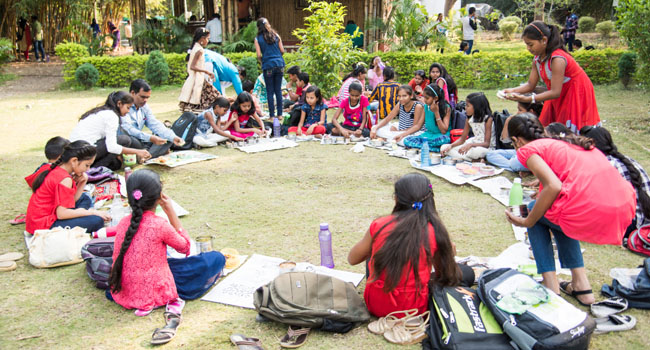Why Outdoor Education is Required for Students?

Outdoor education or kinesthetic learning is synonymous to active learning and adventure outdoors. With changing lifestyle, children are prone to spend more time on technology, thus losing their ability to experience their surroundings.
Learning has become more theoretical rather than giving them a practical understanding of the 5Ws and 1H (what, why, who, when, where and how). Irrespective of the traditional classroom, outdoor learning is about improvising their talent by participation and defining their own terms by self-realization.
Outdoor Education: A Sustainable Educational Tool
Educational institutes are inclining towards digital learning when there is a need for outdoor learning experience where students should be exposed to various realistic challenges.
This form of learning aims to provide high-performance learners with skill sets, improve confidence level, develop competence to overcome stressful emotions and most importantly increase emotional intelligence.
Parents can also play a vital role in engaging children in outdoor activities during weekends or vacations. This will help them to become more productive as they connect more with nature.
11 Useful Benefits of Outdoor Education

- Enhances Self-learning
A child may succeed in academics by bringing good grades but outdoor education enables a deep understanding of academic concepts when their sensory organs are used. Outdoor education improves memory, concentration and overall behaviour of the child.
- Builds Teamwork and Leadership Skills
Outdoor activities like building a tent or finding food in the forest can build an environment for collaboration, teamwork and creative thinking.
It helps children to work as a team making them more sociable and extrovert. It improves peer relationships and broadens their knowledge about the surrounding.
- Improves Academic Performance
Children hugely lack in understanding the basic concepts which are the foundation stone for tomorrow. Outdoor lessons help in preparing the children for the future competitive world. Environmental education programs cater to increase chances for STEM (science, technology, engineering and math) careers and attain standardized test scores.
- Ensures Good Health
A study in Australia published in the International book of obesity suggests that outdoor education can reduce obesity among children. Indoor activities including online engagement lead to anxiety, depression and increase health issues among children.
Along with indoor education, children should be exposed to outdoor activities in order to improve their physical and mental health.
- Reduces Mental Problems
Our body releases a chemical called serotonin or happy hormones in the body when it is indulged in outdoor activities like gardening or listening to songs. A child should continue to feel things that eventually takes him closer to himself/herself.
A rapid increase in peer pressure and academic stress is resulting in depression with high suicide rates among children.
- Develops a better relationship with the environment
Wild adventures help us to respect and appreciate nature. It gives us a larger picture to understand the importance of natural resources, biodiversity, and wildlife which may increase our awareness about the surrounding. There is also a change in attitude, behaviour as a person.
- Evokes Better Memory
When you experience something new and unfamiliar, a chemical called dopamine is released in the hippocampus in the brain where memories are created.
Children get bored when they look at the blackboard, chairs and similar environment every day. Moving out opens fresh stimuli for the senses that enhances better memory.
- Teaches to be Independent
Hands-on learning provides self-learning that makes an individual independent. Experiential learning caters to a willingness to challenge oneself, it pushes to be self-reliant which is required in children.
- Enhances Communication Skills
Outdoor experiences help to create a wide perspective which enables better speaking, writing and communication skills. It makes children curious to discuss, share and speak out their opinions. It also evokes clear understanding, generates ideas, and resolves disputes.
- Renders Service Learning
Community engagement combines learning with the community that ensures social growth and creates awareness about the society in large.
Service learning gives rise to civic attitudes and increases a sense of responsibility towards the community. Students should be encouraged to collect data, participate in public forums, address issues to authorities.
- Cultivates Motivation to Learn
In a research paper titled, ‘The effects of environment-based education on students’ achievement motivation’ by Julie Athman and Martha Monroe where around 400 teenagers were examined, it was found that motivation levels for environmental education were better than traditional schooling.
By connecting learning and the real world, students develop a zeal to understand the content. This also introduces leadership and teamwork qualities.
Environmental education paves the way for better academic scores
Learning in nature gives a sense of the good quality of life to children. It also helps the child in the following ways:
- developing skill set
- improving behaviour
- enabling critical thinking
- cultivating problem-solving skills
- generating communication involvement
Switching to Green Schools: Bringing Nature to the Classroom
The research paper titled ‘Back to school: Back outside!’ by Coyle, K.J. (2010) throws light on ways to bring nature back into classrooms through some minimal changes by creating green schools.
Teachers, parents and schools can follow these ways to make learning fun in the school.
- School Grounds
- Create an outdoor classroom.
- Build an eco-friendly space for recess.
- Create green grounds to enhance wildlife biodiversity.
- School Curriculum
Collaborate with local and national organisations to promote environmental education among children.
- Motivate children in hands-on learning.
- Introduce outdoor education at least once or twice a month.
- Inculcate environmental studies into your teaching and mentoring.
- Students
- Participate in community services like Swachch Bharat Mission which will help in building better civic sense.
- Invite a community to talk on the environment. Arrange regular seminars, workshops to give a proper understanding.
- Increase physical activity by creating a green gym or a gardening room. Try to arrange events such as a marathon, field trips or outdoor programs to get them busy physically.
Along with teachers playing their part in enhancing outdoor schooling, parents should contribute to engage their children into outdoor activities rather than locking them indoors leaving them with TV, video games or smartphones.
Ways parents can engage children at home
- Make it a rule that your child plays outside for some fixed hours every day.
- Plan an adventurous trip into the wild.
- Build a playground in your backyard.
- Arrange for a field trip or a nature park for your child and his friends.
- Join your children to community stewardship programs or environmental activities.
Conclusion
High-tech classrooms are a great source of learning making it more indulging with HD pictures, videos but largely compromises on ‘learning through experience’. Our education system needs to rethink from academic scores to personal, social and spiritual development.
Author Bio
The writer is a career mentor and motivational speaker. Currently, he works as a Marketing Manager at St. Kabir Indian International School, Gujarat. The school ranks among the top CBSE schools in Gujarat.
St.Kabir Indian International School : http://iis.stkabirschool.com/




